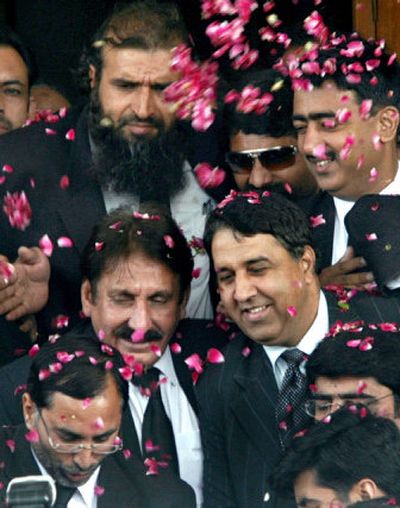World in brief: Ousted chief justice celebrated as hero

Tens of thousands of supporters feted Pakistan’s ousted chief justice as a hero on Saturday, showering him with rose petals and dancing in the streets when he arrived in this opposition stronghold where he has become a focal point for dissatisfaction with President Gen. Pervez Musharraf.
Iftikhar Mohammed Chaudhry spoke at a rally, drawing his biggest crowd since he was forced out by the president March 9. His removal triggered a backlash that is challenging the president’s grip on power as he prepares to seek another five-year term in this key U.S. ally.
Witnesses estimated 50,000-60,000 people gathered along Chaudhry’s route north from the capital of Islamabad to Abbotabad, 30 miles away. People swarmed his vehicle as they danced to the beat of drums, waved flags and chanted, “Go, Musharraf, go.”
Tehran, Iran
Official supports temporary marriage
Iran’s hard-line interior minister is encouraging temporary marriages as a way to avoid extramarital sex, a stance many in this conservative country fear would instead encourage prostitution.
A temporary marriage, or “sigheh,” refers to a Shiite Muslim tradition under which a man and a woman sign a contract that allows them to be “married” for any length of time, even a few hours. An exchange of money, as a sort of dowry, is often involved.
Although the practice exists, it’s not very common in Iran, a Shiite majority nation where many consider it a license for prostitution. Others, however, have advocated institutionalizing the tradition, saying it would help fight “illicit” sex in a country where sexual relations outside marriage are banned under Islamic law.
“Temporary marriage is God’s rule. We must aggressively encourage that,” state-run television quoted Interior Minister Mostafa Pourmohammadi as saying.
The minister, who made his comments Thursday, was the first Iranian official to support the disputed practice in more than a decade.
Gaza City, Gaza Strip
Group threatens TV newswomen
An Islamic group threatened to behead female TV broadcasters if they don’t wear strict Islamic dress, frightening reporters and signaling a further shift toward extremism in the Gaza Strip.
The threat to “cut throats from vein to vein” was delivered by the Swords of Truth, a fanatical group that has previously claimed responsibility for bombing Internet cafes and music shops. The new threat was the first time the organization targeted a specific group of people.
In many parts of the Muslim world, conservative policies keep women out of TV anchor positions or dictate they wear headscarves on air. Headscarves for TV broadcasters are uncommon, however, in Lebanon and Jordan, and even Egypt keeps newscasters who wear them off its TV stations.
Most of the 15 women broadcasters on government-run Palestine TV wear headscarves. But they also wear makeup and Western clothing – not considered strictly observant by extremists.